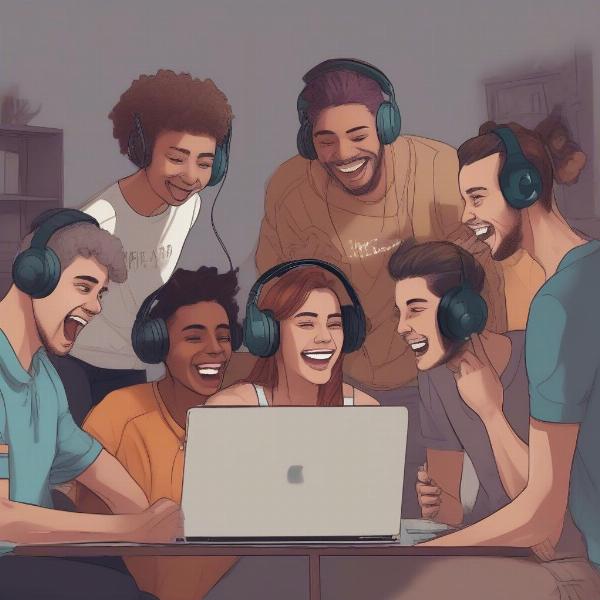Is Playing Video Games A Waste Of Time? It’s a question that has sparked countless debates between gamers, parents, and educators. The answer, like most things in life, isn’t a simple yes or no. While excessive gaming can certainly have negative consequences, moderate and purposeful engagement can actually offer a range of benefits. Let’s delve into the complexities of this often-misunderstood pastime and explore both sides of the coin.
The Perceived Downside: When Gaming Becomes a Problem
The concerns about video games often stem from the potential for addiction and the displacement of other important activities. Excessive gaming can lead to sleep deprivation, neglecting schoolwork or professional responsibilities, and social isolation. These are legitimate concerns, and it’s crucial to acknowledge the potential downsides. Spending hours immersed in virtual worlds can indeed be detrimental if it comes at the cost of real-world obligations and relationships. Furthermore, some studies have linked excessive gaming to anxiety, depression, and aggressive behavior, although the causal relationship is still debated.
Time Management is Key
The key here is moderation and balance. Just like any leisure activity, gaming should be enjoyed responsibly. Setting time limits, prioritizing real-world commitments, and ensuring a healthy balance between virtual and physical activities are crucial for preventing gaming from becoming a problem.
 Impact of Video Game Addiction on Daily Life
Impact of Video Game Addiction on Daily Life
The Untapped Potential: Benefits of Gaming
Beyond the potential pitfalls, video games can offer a surprising array of cognitive, social, and emotional benefits. From improving problem-solving skills and reaction time to fostering teamwork and communication, gaming can be a powerful tool for personal growth.
Cognitive Enhancement
Many video games require players to think strategically, solve puzzles, and make quick decisions under pressure. These activities can enhance cognitive functions such as problem-solving, critical thinking, and spatial reasoning. Action games, in particular, have been shown to improve reaction time and hand-eye coordination.
Social Connection and Collaboration
Online multiplayer games provide opportunities for social interaction and collaboration. Players work together towards common goals, communicate strategies, and build relationships with people from diverse backgrounds. These experiences can foster teamwork, leadership skills, and a sense of belonging.
 Building Community Through Online Gaming
Building Community Through Online Gaming
Emotional Resilience and Stress Relief
Gaming can also serve as a healthy outlet for stress relief and emotional regulation. Immersing oneself in a virtual world can provide a temporary escape from real-world pressures and allow players to explore different emotions in a safe and controlled environment. Some games even incorporate therapeutic elements, helping players cope with anxiety, depression, and other mental health challenges.
Career Opportunities
The gaming industry itself offers a plethora of career opportunities, from game development and design to esports and content creation. Skills honed through gaming, such as problem-solving, creativity, and communication, can be valuable assets in various professional fields.
Is Gaming a Waste of Time? A Balanced Perspective
Ultimately, the question of whether gaming is a waste of time depends on the individual and their approach to the activity. Like any form of entertainment, gaming can be beneficial when enjoyed in moderation and with a sense of purpose. It’s about finding a healthy balance between virtual and real-world experiences, prioritizing responsibilities, and harnessing the potential benefits that gaming can offer.
 Balancing Gaming with a Healthy Lifestyle
Balancing Gaming with a Healthy Lifestyle
Related Topics: Expanding the Conversation
The Impact of Esports on the Gaming Landscape
Esports has revolutionized the perception of gaming, transforming it from a hobby into a professional career path for many.
The Role of Parents in Guiding Healthy Gaming Habits
Parental guidance plays a crucial role in ensuring that children develop healthy gaming habits and avoid the potential pitfalls of excessive screen time.
The Future of Gaming: Emerging Technologies and Trends
The gaming industry is constantly evolving, with new technologies and trends shaping the future of interactive entertainment.
Conclusion
So, is playing video games a waste of time? The answer is a resounding no, provided it’s approached with balance and mindfulness. Gaming, like any other activity, can be a valuable tool for personal growth, social connection, and even career development when enjoyed responsibly. The key lies in managing time effectively, prioritizing real-world commitments, and harnessing the unique benefits that gaming has to offer. Embrace the positive aspects of gaming, and remember to play responsibly. Share this article with anyone struggling with the question of gaming’s value.
FAQ
-
Can video games improve cognitive skills?
Yes, certain video games can enhance cognitive functions such as problem-solving, spatial reasoning, and reaction time. -
Are there social benefits to gaming?
Online multiplayer games can foster teamwork, communication skills, and a sense of community. -
How can I prevent gaming addiction?
Setting time limits, prioritizing real-world responsibilities, and maintaining a balanced lifestyle are crucial. -
Can gaming be a career?
The gaming industry offers diverse career opportunities, from game development to esports and content creation. -
Is gaming always bad for you?
No, moderate and purposeful gaming can offer various benefits. Excessive gaming, however, can have negative consequences. -
How can I find a balance between gaming and other activities?
Prioritize essential tasks, schedule specific gaming times, and engage in a variety of activities to maintain a well-rounded lifestyle. -
What are some positive aspects of gaming?
Gaming can improve cognitive skills, foster social connections, provide stress relief, and even offer career opportunities.

